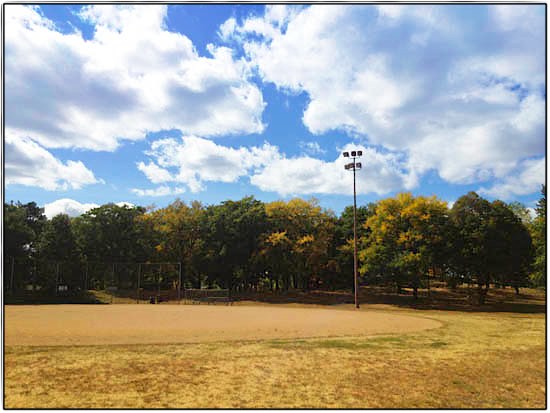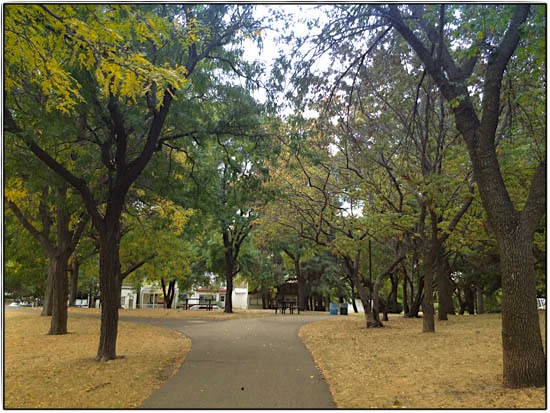Rumbled up the boiler Saturday night. The day was cool and it sunk into the house; all the stored goodwill from summer had finally left, and it was back to closing doors to keep the heat in. Which makes the rooms stuffier, yes, but it’s nice to walk into my studio and feel the enveloping warmth.
Earlier I’d stood outside for an hour and helped time daughter’s soccer game. I would say “it’s been five minutes” and then they’d change the roster. A nice little park - never been there.


They’re everywhere, these places. You can live here 30 years and keep discovering them.
It was a cool Saturday afternoon, and on the drive back home along the gorgeous parkway you could tell that Autumn was coming into its own, gaining momentum and confidence, gathering acolytes to the cause. The big willows - always a stunning sight the long lines gathered en masse against the chaos of the million fluttering leaves - were still green, but like all the trees that have kept their hue, they’re pale. The fight’s gone out of them. The sun still makes nice speeches but its voice is thin and strained. The tide has turned.
But they won the game, 6-1. Afterwards the girls formed a huddle and yelled some made-up victory chant with enough rhymes to hold it together, and broke with a great cry of glee and delight. There may be nothing better in life than to be 12 years old.
A weekend of avoiding anything that could possibly be construed as a “productive endeavor,” and so I feel good and disappointed in myself. Or bad and disappointed. Not the most pleasant of emotions, but it’s good to know you have it in you. Or bad to know. No, good to know. In the sense that you can be bad. Which means you can tell the different, right?
“Good and” seems to have slipped out of the lexicon, he said, changing the subject. It’s an intensifier without the attributes of Goodness, as in “I’m good and disgusted with you,” unless it’s “Good ‘n’ Plenty,” a licorice candy known to kids in my era as a purple food with a shiny, almost shellacked carapace, interspersed with much more pliable modules.
Basically, I rearranged things. That’s what I did. Started two new sites, edited vacation video, edited the Baltics trip photo book. I’m terrified of losing all the photos, even though I have them backed up six different ways - although it’s amusing, really, because in the long run, only the ones I print off in book form will survive, and they'll end up in an antique store that sells bygone remnants when not renting rooms to Outer Party members for an afternoon tryst between aerial bombings. There’s a huge futility to all this, of course; it’s like nailing the shadows to a stone. In the long run, the things we assemble will not survive when Sol goes nova. But it helps, somehow, to save what you can. Sometimes I think that half of what I do is a reaction to what my parents didn't.
There's a new wrinkle, eh? That never shaped anyone's life before.
The Friday Face: as I said, it's easy. Ol' Joe Cotton.

If he'd played nothing but dissolute, rural Southerners, that would have been the perfect name. Ol ' Joe Cotton. The question, however, was two-fold: given his outfit, where is he? Well, men wore white suits in those days in hot climates, so it could be Cuba or South America, but the eyepatch suggests recent war injury, so . . . anyone have Spain during the Civil War?
The movie was "The Woman in Red," an utterly inert movie that was trouble from the opening credits. The minute you suspect it's an "international production" you know it's going to bark, and bark loud. (And the barks will be dubbed.) Dirk Bogarde as a priest who gives up his priestlyness so he can almost have sex with Ava Gardner while fascism is on the march. I gave up on it soon enough.
----
I wonder if I should call Peg Lynch today. She’s 96. I found her phone number online. I mentioned her radio show a few weeks ago - “The Couple Next Door,” which joined my list of morning programs. (I avoid all news until about 11 or so, and spend the morning working while listening to a playlist of old radio shows - serials and dramas.) “Couple” was a domestic sitcom aimed at the women cleaning up or having a smoke after the dishes were done, something to listen to, friends to catch up with. She wrote it and acted the part of the wife.
That’s the world she described, right up there at the top of the page. I keep coming back to that Better Homes and Garden cover in the fall - I’ve used it here, here, and here. It was one of the first things I ever scanned, and it’s an issue my mother kept and set aside for reasons I’ll never know.
As we understand now this is perhaps the worst model for social organization, since it consumes resources, depletes the core cities, leads to alienation, and fails to foster the correct attitude towards property. I thought of this today in the Hunt & Gather antique store, and beheld an enormous Firestone Tire 1949 wall calendar. Father in office uniform - shirt, tie - with his hand on his son’s shoulder. Son is wearing a Scouting uniform. The sky is filled with planes - bombers, figher planes, civilian airlines, even dirigibles. They have an expression of pride and optimism. Inset quote: That government by the people and for the people shall not perish from the earth.
No doubt someone would see the image as fascist, given the way it intertwines corporate identity, patriotism, domestic life, militarism, and rigid gender identity. The past is a constant insult. Unless you define the images in the poster as parental bonds, shared values, the connective tissue of voluntary civic associations, defense against authoritarian ideologies, and so on. Why, it’s as if a picture of dad and son watching the planes go by isn’t a symbol of everything wrong with America, after all.
Nothing we built is without sin, so it’s all cursed. (Unless it’s an adorable Tupperware set on eBay, that’s permitted.) But our conception of their conceptions is correct and right and true, and since we have it all figured out now, there’s really nothing in the past we need to bring along - except pictures of neat-o retro stuff that would put our own irresolute styles to shame, if shame was a thing we were accustomed to feeling, except on the behalf of others.
We burn the plays but we spare the sets.
But, you say, you convenient interior voice who expresses contrary observations in a fashion I can easily dismiss, didn’t the style at the top of the page abolish its predecessors with the same la-de-da disregard for history? Yes. It did. But it didn’t have to disparage history to thrive; it didn’t have to find something morally suspect in the old styles. A change in tastes + the thrill of the modern + a rare clean-break moment in the culture (WW2 over, great technological change, conquest of space imminent, annihilation a constant possibility) meant that the past was just Grandpa on the porch, left with Old Blue the dog and a whittlin’ stick. Whatever change came about was a progression of what was right about things, not a repudiation of what was wrong.
I know. It’s a lot to read into a 1957 magazine cover. I'm spent. Babbling now. It was an odd week and an odd weekend. Enough of me. Go look at some motels! See that badge over there? Go.
And: See you on the Strib blog around noon; will probably discuss the Jetsons. Lint usually goes up around noon-thirty.
-----
Oh, did I mention there's a book? See you around.